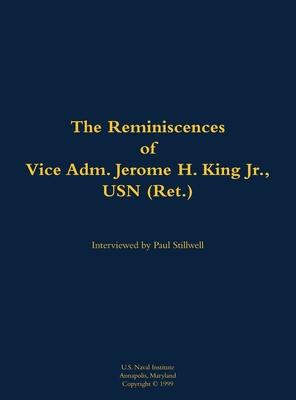In 1941 King graduated from Yale University and received his naval commission through the NROTC program. He is perhaps the first NROTC graduate to achieve three-star rank in the U.S. Navy. He spent most of World War II serving in two light cruisers, the USS Trenton (CL-11) and USS Mobile (CL-63). Later in the 1940s he was officer in charge of a school for gunner’s mate training in Anacostia, D.C., executive officer of the destroyer USS Moale (DD-693), and attended postgraduate school to learn about nuclear weapons. In the 1950s served on the staff of the Surface Antisubmarine Development Detachment of the Operational Development Force, commanded the escort destroyer USS Bache (DDE-470), was the nuclear weapons requirements officer on the OpNav staff, and a student in at the Naval War College. While on the staff of Commander Carrier Division Six, he served under two future CNOs, George Anderson and Thomas Moorer. Later he commanded Destroyer Division 601, Nuclear Weapons Training Center, Atlantic, and the destroyer tender USS Yellowstone (AD-27). He was planning officer on the Seventh Fleet staff when the Vietnam War began in earnest in the mid-1960s. Later in that decade he was executive assistant to CNOs David McDonald and Thomas Moorer, Commander Destroyer Squadron One and Commander Antisubmarine Warfare Group One. In the latter capacity he presided in 1969 over the international inquiry into the collision between the Australian carrier Melbourne and U.S. destroyer USS Frank E. Evans (DD-754). Following duty in OpNav, in the spring of 1970 he succeeded Vice Admiral Elmo Zumwalt as Commander Naval Forces Vietnam. He had a difficult, frustrating tour as the war was winding down. He concluded his career in Washington as Deputy Chief of Naval Operations (Surface Warfare) and as J-3 on the Joint Staff. He retired from active duty in 1974. The oral history contains a detailed description of his battle against lung cancer in the 1990s. King passed away in 2008.
| FindBook |
有 1 項符合
Reminiscences of Vice Adm. Jerome H. King Jr., USN (Ret.)的圖書 |
 |
Reminiscences of Vice Adm. Jerome H. King Jr., USN (Ret.) 作者:King 出版社:US Naval Institute Press 出版日期:1974-01-15 語言:英文 規格:精裝 / 510頁 / 27.94 x 21.59 x 2.87 cm / 普通級/ 初版 |
| 圖書館借閱 |
| 國家圖書館 | 全國圖書書目資訊網 | 國立公共資訊圖書館 | 電子書服務平台 | MetaCat 跨館整合查詢 |
| 臺北市立圖書館 | 新北市立圖書館 | 基隆市公共圖書館 | 桃園市立圖書館 | 新竹縣公共圖書館 |
| 苗栗縣立圖書館 | 臺中市立圖書館 | 彰化縣公共圖書館 | 南投縣文化局 | 雲林縣公共圖書館 |
| 嘉義縣圖書館 | 臺南市立圖書館 | 高雄市立圖書館 | 屏東縣公共圖書館 | 宜蘭縣公共圖書館 |
| 花蓮縣文化局 | 臺東縣文化處 |
|
|
圖書介紹 - 資料來源:博客來 評分:
圖書名稱:Reminiscences of Vice Adm. Jerome H. King Jr., USN (Ret.)
|











